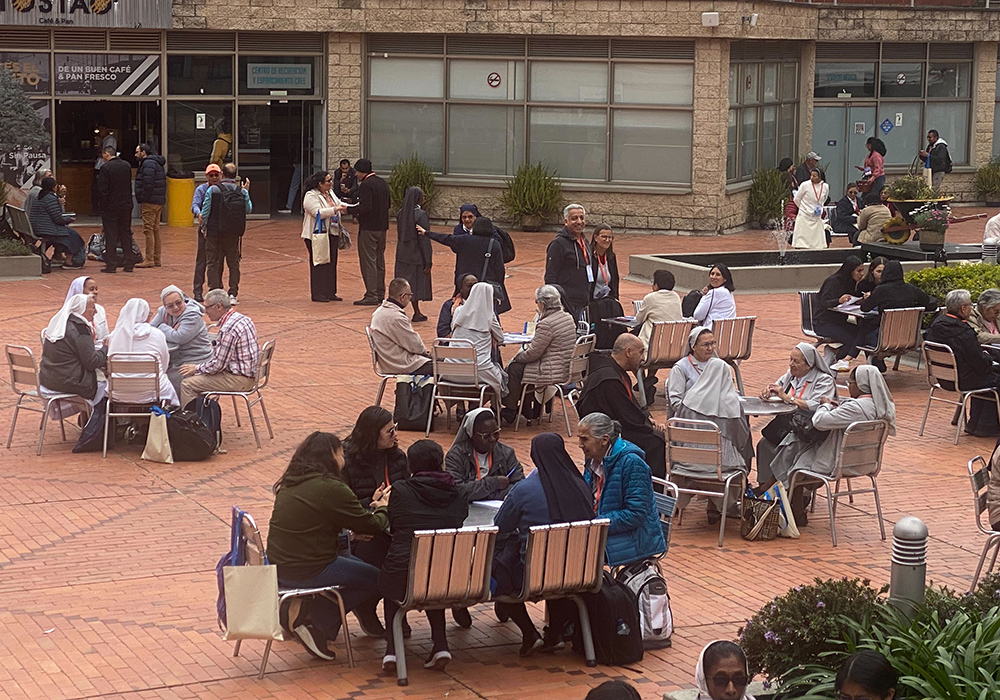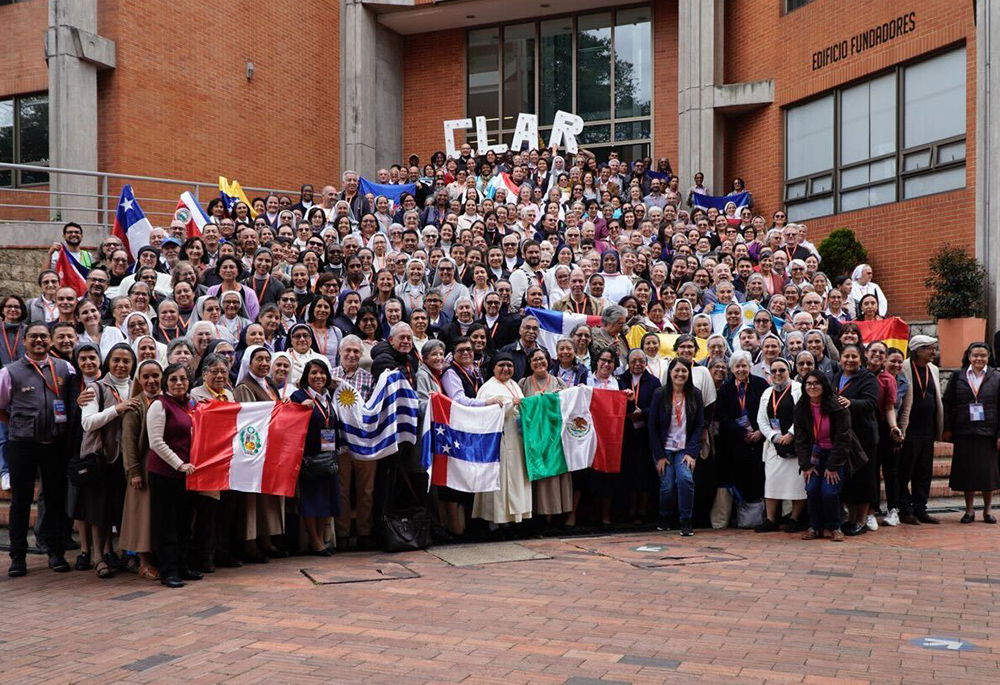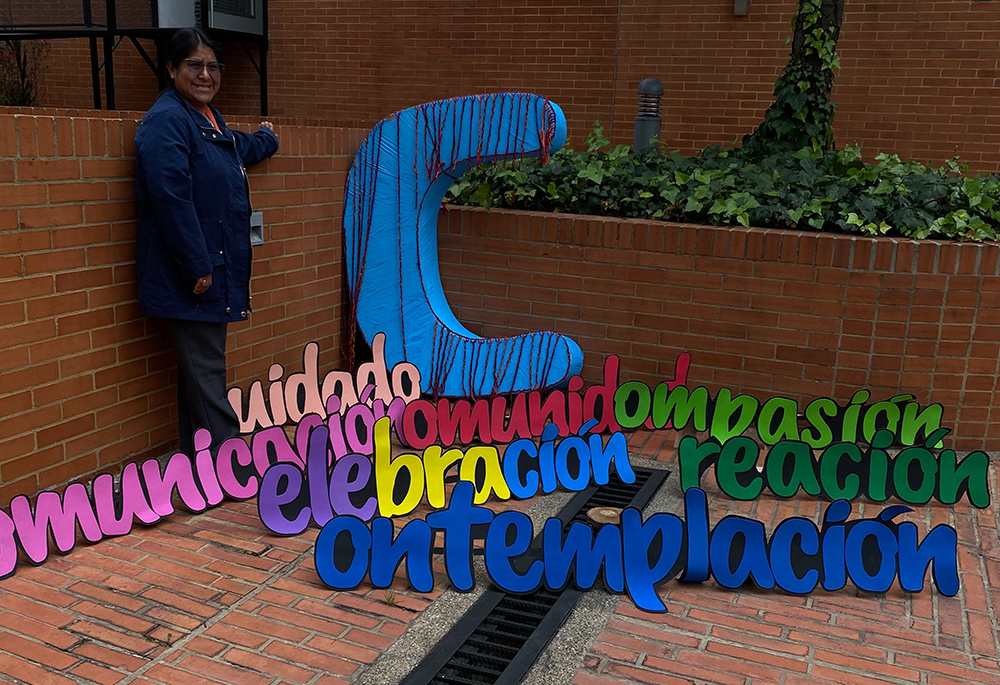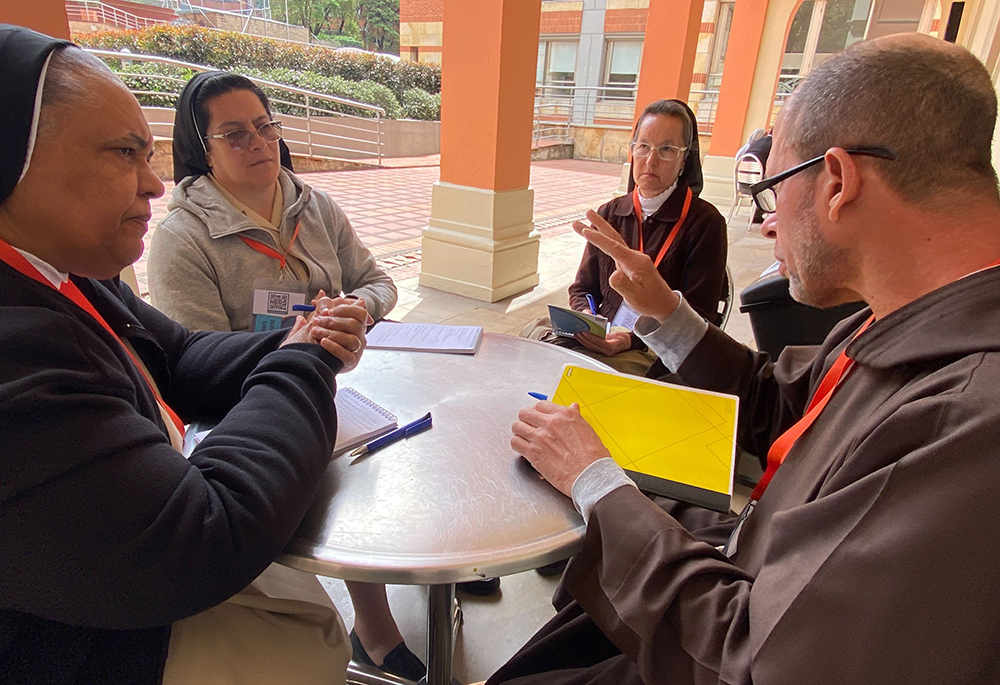
Participants of the IV Latin American and Caribbean Congress of Religious Life gathered in small groups Nov. 24 on the campus of La Salle University in Bogotá, Colombia, to talk about their experiences in consecrated life. While they gathered and dialogued much in the style practiced at October's synod on synodality at the Vatican, some said it is a style religious communities have long used. (GSR photo/Rhina Guidos)
Change — in structures, thinking and practices — seemed to be much on the minds of women and men religious who participated Nov. 24-26 in the IV Latin American and Caribbean Congress of Religious Life in Colombia's capital of Bogotá. The more than 500 members who attended in person, and about 3,000 online, contemplated the changes consecrated life is going through as vocations dwindle and religious communities shrink. But they also opted to embrace changes that could bring about a new type of consecrated life and to allow themselves to be surprised by the Spirit.
"We need to review whether these structures, whether our structures of community life today work or don't work," Passionist Fr. Tarcisio Gaitán said to those at the gathering organized by the Confederation of Latin American and Caribbean Religious, known as CLAR for its acronym in Spanish.
The event at Bogotá's LaSalle University, urged participants to construct a way of life as "artisans of care," for themselves, their religious communities and those they serve.
Much of the gathering seemed to tie back to October's synod on synodality at the Vatican, which several members of CLAR, the largest organization of women and men religious in Latin America, attended. One of them was Sr. Liliana Franco Echeverri, CLAR's president, and one of more than 50 women from around the world who took part in a synod for the first time.
"Synodality is a way of being, of doing, of celebrating our identity in the church … and one that is updated every day … when we prepare to share, to discern and make decisions as brothers and sisters," Franco said, a member of the Company of Mary.

Members of the Confederation of Latin American and Caribbean Religious, or CLAR, pose for a group photo Nov. 26 with those who attended the IV Latin American and Caribbean Congress of Religious Life in Colombia's capital of Bogotá. (Courtesy of Confederation of Latin American and Caribbean Religious)
That means, for members of consecrated life, a revision of structures that were useful for centuries, Gaitán said, but may no longer be life-giving.
In welcoming those who attended the congress, Franco said Nov. 24 that "our structures are in need of renewal," because "there are structures that suffocate and ways of proceeding that deny what is human." Sometimes, in those structures, "the person is not at the center, and the echo of the Gospel is clouded by legalisms and ways of proceeding," she added.
Franco said those structures sometimes produce a heavy feeling of failure that is discouraging and in other instances, the power those structures produce is used to control and pigeonhole. The need for renewal also is apparent because of the "horror of our abuses," which have denied others dignity and diminished faith and joy, she said.
When it comes to abuse, of any sort, those who do not nothing also are victimizers, said Benedictine Sr. Maricarmen Bracamontes, who addressed on Nov. 24 the need to rethink structures that have allowed abuse to continue.
Advertisement
She offered the example of a group of sisters who were tasked with running a listening center for potential abuse victims in a diocese. As part of their job, they presented the bishop with three cases of abuse, she said.
"There was more care for the victimizer than the victim, and since it was among themselves, then that's where it stopped," she said of the lack of action on the part of the prelate.
The sisters resigned from their posts, Bracamontes said, adding the necessity to rethink a structure that puts a bishop, who acts like a "father" to priests, also as the "judge" in cases of abuse that involve them.
The church cannot accept silence or cover-ups, she said.
"It's not a negotiable question and it's important to pursue the search of truth and the reestablishment of justice in the bosom of the ecclesial community," she said.
To bring about that renewal of structures, said Franco, it's necessary to contemplate Jesus, to study his way of being, serving and using authority. She asked CLAR's members to practice seven actions that start with the letter C — care, contemplation, communication, celebration, creation, community and compassion — which have the power to "mold our hearts in a new way," she said.

A woman poses with a display of seven words starting with the letter C on the campus of La Salle University Nov. 24 in Bogotá, Colombia. The president of CLAR, which organized the IV Latin American and Caribbean Congress of Religious Life Nov. 24-26, said she hoped that practicing care, contemplation, communication, celebration, creation, community and compassion would "mold our hearts in a new way," referring to those in consecrated life. (GSR photo/Rhina Guidos)
Participants watched as a painter, during the conference's three days, composed a work of art in one part of the stage where the gathering took place as presenters spoke about one of those seven Cs nearby.
Sr. Silvia Bautista watched Jafeth Gómez Ledezma, the artist at work, as he looked at a blank page when Sr. Dolores Palencia, superior general of the Congregation of St. Joseph of Lyon, began speaking about compassion and her work with migrants. The painter listened, contemplated the canvas, and went to work.
"He went adding life to it, dedicating more time to it, giving it some paint, seeing what was missing, taking some paint, caring enough to put the top back so it [the paint] won't spill and then he places the brush where he thinks it would stand out enough to give it beauty," said Bautista, a Sister of Charity of Cardinal Sancha, to others in a small group. "He gave it care, tenderness. He is not in a hurry, but he stopped to see what he was going to do. I think we, too, need to slow down. We live in a big hurry."
As "artisans of care," members of the consecrated life need to follow the practices of the artist, she said, to slow down, contemplate and figure out how to best create something beautiful.

A group of sisters participate in an exercise on embracing commonalities Nov. 25 at the auditorium of La Salle University in Bogotá, Colombia. More than 500 women and men religious, and some lay Catholics, attended the IV Latin American and Caribbean Congress of Religious Life Nov. 24-26 to share experiences in consecrated life. (GSR photo/Rhina Guidos)
This year, the event included participation of members of the U.S.-based Leadership Conference of Women Religious and the executive secretary of the Canadian Religious Conference, who addressed the decline in vocations and shrinking religious communities.
"In North America, the reality of consecrated life is very particular," Canada's Fr. Alain Ambeault, a member of the Clerics of St. Viator, told the group. "After decades of notable growth, we are living a moment of a vocational desert, and we share a conviction that this is a time of transition, that the Spirit is acting to give birth to other models of consecrated life, and that, according to the values, will adapt better to the reality of today's world."
Sr. Teresa Maya, a member of the Congregation of the Sisters of Charity of the Incarnate Word in San Antonio, Texas, and past president of LCWR, told participants at the Nov. 25 session that consecrated life is entering a generational change, an "unprecedented" time that "will be one of the most difficult in the history of consecrated life."
She urged religious communities to become comfortable with those moments of transition because they are coming, regardless of whether they are ready. Looking at the past as a "golden age" and creating mental lagoons of less stellar moments asphyxiates consecrated life, she said, urging members not to be afraid of what's to come.

A group of Sisters of Charity of Cardinal Sancha and a Capuchin Franciscan gathered in a small group Nov. 24 on the campus of La Salle University in Bogotá, Colombia, to talk about their experiences in consecrated life, contemplating a change in structures and ways of improving community life. (GSR photo/Rhina Guidos)
CLAR also hosted a panel of young Catholics who spoke during the congress about what they liked and disliked about consecrated life. While most praised the work of men and women religious with youth, their selfless lives of simplicity and the help they provided during Colombia's conflict, they also criticized the rigidity of consecrated life, the priority some members have given to rules instead of prioritizing the well-being of a person, including members of the LGBTQ community, and the use of precious metals such as gold for religious ceremonies without giving thought as to the harm their extraction may have caused people and nature.
Sr. Isabel Ramirez Haro, of Peru's Parochial Missionaries of the Infant Jesus of Prague, said she understood and welcomed the criticism.
"It's valid," she told Global Sisters Report Nov. 26. "Today, the poor have a different face. Some people don't feel at home in the church. I have friends who don't feel at home in the church and feel cast out, but they are sons and daughters of the same God. That's what's happened also with racial stigmatization. In the church, we cannot be second- or third-class citizens. Our baptism makes us all citizens of the same God because we follow one Lord, one faith and one baptism."
The gathering ended with a "Manifesto of Care" that various CLAR members read, and included their commitment to be custodians of communion; to recognize, with much pain, the sins of abuse, including sexual abuse, abuse of power and conscience; to recognize the comfort found in rigid and authoritarian relationships; to try to grow in compassion with the most vulnerable and "act like a true Samaritan church"; to hear the cry of migrants, and of those who can't find meaning in their existence; to care for those with addictions, to be at the side of victims whose rights have been violated; and to care for the common home and join with other organizations that want to care for Mother Earth.





